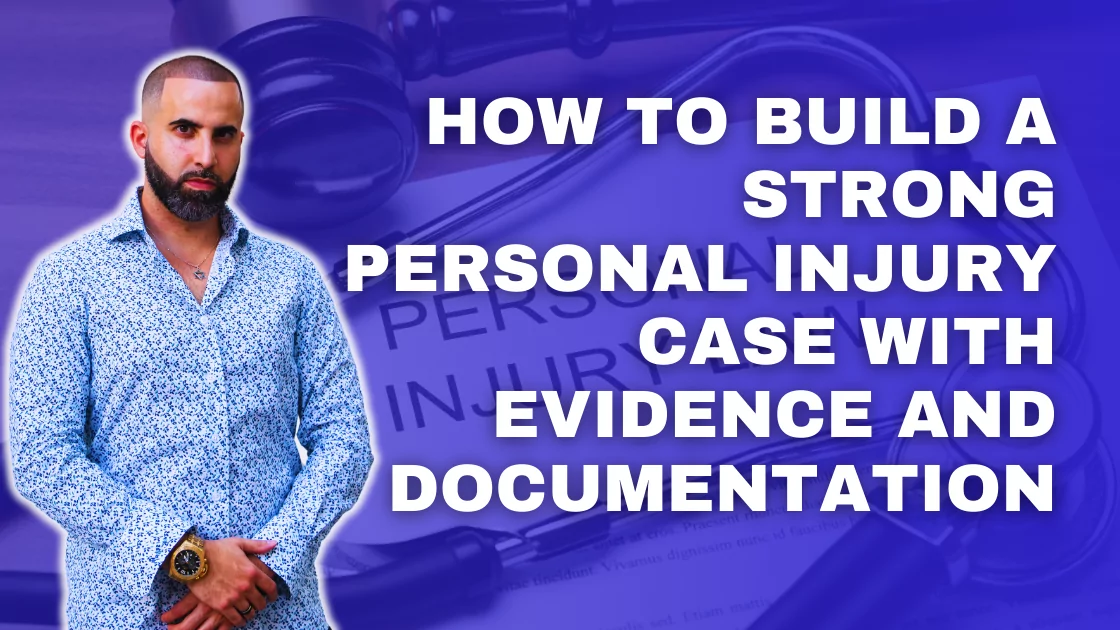The path to justice after a personal injury often hinges on a seemingly mundane but profoundly impactful factor: evidence and documentation. These records and proof not only narrate the story of the incident but also stand as pillars supporting your pursuit of rightful compensation.
In our exploration of “Building a Strong Personal Injury Case,” we delve into the vital role that meticulously gathered proof plays in shaping legal outcomes. From medical records detailing the extent of injuries to eyewitness accounts capturing the event’s essence, each piece forms a crucial puzzle. In this intricate process, the expertise of an Orlando personal injury attorney can be the linchpin, guiding you through the complexities and ensuring every piece of evidence contributes to the strength of your case.
Immediate Steps After an Incident
Immediately following an accident or injury, swift and decisive actions are paramount in safeguarding both health and legal interests. First and foremost, seek prompt medical attention, even if injuries seem minor. Timely medical records not only ensure your well-being but also serve as foundational evidence. Simultaneously, report the incident to the relevant authorities, ensuring an official record of the event. This report can be pivotal in establishing the circumstances of the injury. Cooperate fully with law enforcement, providing accurate details while refraining from admitting fault. Document the scene through photographs or videos, capturing any visible damages.
Remember, these immediate steps not only prioritize your health but also lay the groundwork for a strong personal injury case, bolstering your credibility and the validity of your claims.
Medical Records and Reports
Comprehensive medical records are the cornerstone of a robust personal injury case, providing crucial evidence to support claims. Collecting vital documentation, such as detailed hospital records, doctor’s notes, and diagnostic reports, is imperative. These records not only chronicle the extent of injuries but also establish a direct link between the incident and subsequent medical treatment. They serve as tangible proof of damages, enabling a clear understanding of the impact on physical well-being. They also offer an indisputable foundation for building a compelling case and ensuring a fair assessment of the damages suffered.
Photographic and Video Evidence
The significance of visual evidence cannot be overstated, especially in personal injury claims which makes it a powerful ally in the pursuit of justice. Even the Orlando personal injury attorney stresses the importance of capturing clear, detailed photos and videos at the accident scene, documenting injuries, and portraying the aftermath. These visual records serve as compelling proof, vividly illustrating the circumstances and consequences of the incident. They provide a tangible, irrefutable account that bolsters the credibility of a personal injury claim. From damaged property to physical injuries, visual evidence plays a pivotal role in communicating the impact of the incident.
When building a case, a Florida wrongful death attorney recognizes that well-documented visuals can be instrumental in negotiations or court proceedings. This lends authenticity to the narrative and secures a fair assessment of damages.
Witness Statements
Eyewitness accounts hold immense value in substantiating events leading to an injury, serving as pivotal components in building a compelling case. Obtaining accurate and detailed witness statements is crucial. So, do seek immediate statements, encouraging witnesses to include specific details like time, location, and their perspective on the incident. They add credibility to the narrative, corroborating the injured party’s version and fortifying the foundation of the case, a practice recognized by a Florida wrongful death attorney for their role in ensuring a thorough and accurate depiction of events.
Documentation of Lost Wages and Financial Impact
Documenting economic losses arising from an injury is paramount for a robust personal injury case. Accurate and comprehensive records substantiate claims and strengthen the pursuit of rightful compensation. The significance of preserving documents such as pay stubs, tax returns, and medical bills to support claims for lost wages, medical expenses, and other financial impacts is often emphasized. These documents provide tangible proof of the economic ramifications, offering a clear picture of the financial toll the injury has taken. Through meticulous documentation, individuals enhance the credibility of their claims and facilitate a more precise evaluation of damages.
Preserve and Organize Evidence
There is no denying the fact that preserving and organizing evidence is a key factor in ensuring its admissibility and effectiveness in court. Start by creating contemporaneous notes immediately after the incident, detailing relevant information while memories are fresh. These notes act as a reliable record of events.
Preserve physical evidence carefully, ensuring it remains unaltered and intact. This can be done by photographing and cataloging items meticulously. Keep all evidence in a secure and controlled environment to prevent damage or tampering. Organize documentation logically, categorizing medical records, witness statements, and other materials chronologically or thematically. Label files clearly to facilitate easy retrieval. By adhering to these practices, individuals enhance the credibility of their personal injury cases. This is one of the many strategies recognized by a Florida wrongful death attorney for its role in presenting a clear and organized narrative during legal proceedings.
Takeaway
In navigating the complexities of a personal injury case, we’ve unveiled the critical role of evidence and documentation. From immediate post-incident actions to the meticulous organization of medical records, witness statements, and financial documents, each step contributes to the foundation of a strong case.
As we conclude, remember that this comprehensive approach not only prioritizes your health and credibility but also forms the bedrock for a successful personal injury claim. A well-documented case speaks volumes in court, ensuring a fair evaluation of damages and securing the justice you rightfully seek.



